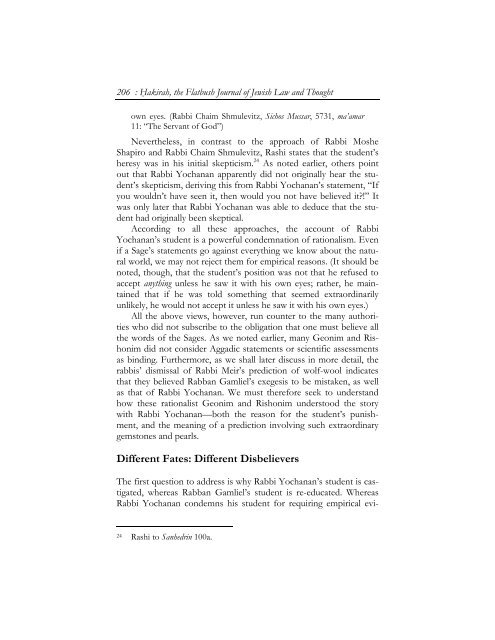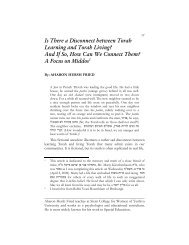Messianic Wonders and Skeptical Rationalists - Hakirah.org
Messianic Wonders and Skeptical Rationalists - Hakirah.org
Messianic Wonders and Skeptical Rationalists - Hakirah.org
You also want an ePaper? Increase the reach of your titles
YUMPU automatically turns print PDFs into web optimized ePapers that Google loves.
206 : Hạkirah, the Flatbush Journal of Jewish Law <strong>and</strong> Thought<br />
own eyes. (Rabbi Chaim Shmulevitz, Sichos Mussar, 5731, ma’amar<br />
11: “The Servant of God”)<br />
Nevertheless, in contrast to the approach of Rabbi Moshe<br />
Shapiro <strong>and</strong> Rabbi Chaim Shmulevitz, Rashi states that the student’s<br />
heresy was in his initial skepticism. 24 As noted earlier, others point<br />
out that Rabbi Yochanan apparently did not originally hear the student’s<br />
skepticism, deriving this from Rabbi Yochanan’s statement, “If<br />
you wouldn’t have seen it, then would you not have believed it?!” It<br />
was only later that Rabbi Yochanan was able to deduce that the student<br />
had originally been skeptical.<br />
According to all these approaches, the account of Rabbi<br />
Yochanan’s student is a powerful condemnation of rationalism. Even<br />
if a Sage’s statements go against everything we know about the natural<br />
world, we may not reject them for empirical reasons. (It should be<br />
noted, though, that the student’s position was not that he refused to<br />
accept anything unless he saw it with his own eyes; rather, he maintained<br />
that if he was told something that seemed extraordinarily<br />
unlikely, he would not accept it unless he saw it with his own eyes.)<br />
All the above views, however, run counter to the many authorities<br />
who did not subscribe to the obligation that one must believe all<br />
the words of the Sages. As we noted earlier, many Geonim <strong>and</strong> Rishonim<br />
did not consider Aggadic statements or scientific assessments<br />
as binding. Furthermore, as we shall later discuss in more detail, the<br />
rabbis’ dismissal of Rabbi Meir’s prediction of wolf-wool indicates<br />
that they believed Rabban Gamliel’s exegesis to be mistaken, as well<br />
as that of Rabbi Yochanan. We must therefore seek to underst<strong>and</strong><br />
how these rationalist Geonim <strong>and</strong> Rishonim understood the story<br />
with Rabbi Yochanan—both the reason for the student’s punishment,<br />
<strong>and</strong> the meaning of a prediction involving such extraordinary<br />
gemstones <strong>and</strong> pearls.<br />
Different Fates: Different Disbelievers<br />
The first question to address is why Rabbi Yochanan’s student is castigated,<br />
whereas Rabban Gamliel’s student is re-educated. Whereas<br />
Rabbi Yochanan condemns his student for requiring empirical evi-<br />
24 Rashi to Sanhedrin 100a.
















